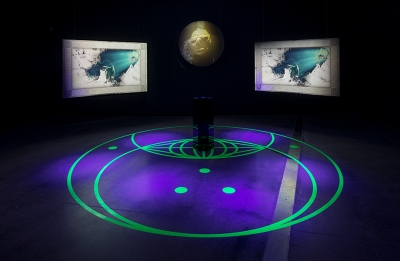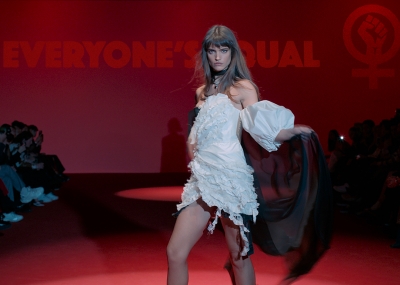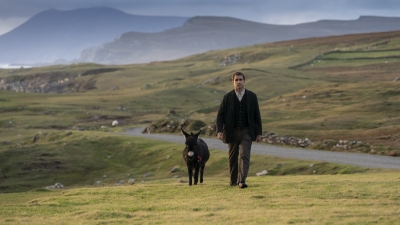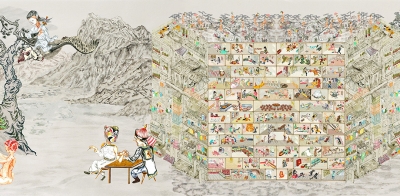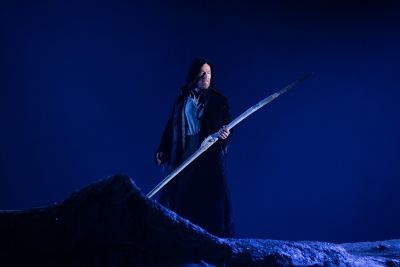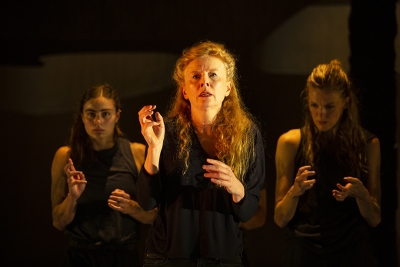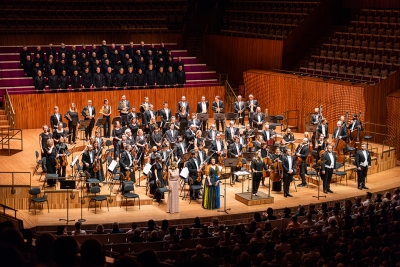Arts
Film | Theatre | Art | Opera | Music | Television | Festivals
Welcome to ABR Arts, home to some of Australia's best arts journalism. We review film, theatre, opera, music, television, art exhibitions – and more. To read ABR Arts articles in full, subscribe to ABR or take out an ABR Arts subscription. Both packages give full access to our arts reviews the moment they are published online and to our extensive arts archive.
Meanwhile, the ABR Arts e-newsletter, published every second Tuesday, will keep you up-to-date as to our recent arts reviews.
Recent reviews
Is there now an elemental quality to data? Amazon and Meta have certainly demonstrated that data can be harnessed like a natural resource. Yet given that we, the users, shed data at an uncontrollable and unknowable rate, perhaps Jeff Bezos and Mark Zuckerberg are not twenty-first century oil barons so much as the managers of a silkworm farm? Is all this data just simply information? Do we even have a right to claim it back? ... (read more)
People’s taste in satire can be as acquired and specific as their taste in art overall; some favour scalpel-like precision (the television of Armando Iannucci), while others prefer more of a sledgehammer approach (the films of Adam McKay). Your appreciation for Ruben Östlund’s Triangle of Sadness will vary depending on your tolerance for sweeping observational class satire (and the on-screen depiction of bodily fluids) ... (read more)
When did nice become an insult, and simple such a burden? Pádraic Súilleabháin (Colin Farrell) is a nice man, leading a simple life on the fictional island of Inisherin, just off the coast of Ireland. The year is 1923. Even as a civil war rages across the water, for Pádraic all is well in the world so long as he gets to meet his lifelong friend, Colm Doherty (Brendan Gleeson), at the pub at 2 pm every day for a pint. ... (read more)
After a welcome return to something approaching a pre-Covid normal season of training camps and concerts, the Australian Youth Orchestra has finished the year with a grand public concert at the Melbourne Town Hall.
... (read more)1843 was quite the year in Christmas lore. It can boast both the first Christmas cards, commissioned by Sir Henry Cole, and the first edition of Charles Dickens’s A Christmas Carol. Our passion for the former may have ebbed a little in the age of digital communication, but Dickens’s novella – albeit most commonly in one of its many theatrical adaptations – continues to draw our interest. Melbourne is currently hosting the Old Vic production of Jack Thorne’s adaptation at the Comedy Theatre (with David Wenham as Scrooge). Now it also has an opera première: composer Graeme Koehne and librettist Anna Goldsworthy’s version for Victorian Opera. ... (read more)
Outlaw, the opening exhibition of the purpose-built new media gallery at Sydney Modern, (the Art Gallery of New South Wales’s new extension) features Howie Tsui’s mesmerising multimedia installation, Retainers of Anarchy. On a 27.4-metre long, 3.85-metre high projection, which simulates the form of a scroll painting, hundreds of images hand-drawn in ink are animated into a kaleidoscope of supernatural severed heads, grotesque tortures, and characters familiar from wuxia (martial arts) novels and television series. These fantastical images jostle with motifs of everyday life in Hong Kong and iconic figures from the pro-democracy protests that culminated in the Umbrella Movement of 2014 and were later to erupt in the all-out rebellion in 2019 and its violent suppression by Xi Jinping’s government. ... (read more)
The Sydney Theatre Company’s staging of Shakespeare’s The Tempest, directed by Kip Williams, is centred around a large rock set on a revolving mechanism that assists with scene changes and helps to animate this rather static play about characters shipwrecked on a tropical island. The rock is reminiscent of the story of Prometheus, chained forever to a large rock by Zeus, but this is the ‘hard rock’ to which Caliban (the only character native to the island) is banished by the lordly Prospero, which reminds us that the island (and perhaps even the play) is Caliban’s domain. ... (read more)
Is there any trope more ubiquitous to the horror genre than the jump scare? A sudden scream cuts through a loaded silence; a flitting shadow hosts a monstrous threat. It’s a trope often traced back to 1945’s Cat People. In the film, a scare comes in the form of an errant bus. Known as the ‘Lewton Bus’ after producer Val Lewton, the term is now a kind of genre shorthand, referring to a sequence that gleefully teases its audience with the possibility of an approaching shock. A character, face barely lit, walks down a dark street flinching at shadows. The sound of their rushed footsteps increase in volume and pace before the roar of a bus breaks the tension. Suspense results from the harmony between lighting, mise en scène and sound. We never see our monster, nor do we need to. A bus is scary enough. ... (read more)
Beethoven’s only opera, Fidelio, was one of his most troublesome compositions; the work has never ceased to engender critical controversy, yet remains deeply revered and popular. Thursday’s concert performance at the Sydney Opera House proved no exception in terms of troublesome complications, but more of that later. ... (read more)
Timothée Chalamet, sharp of jaw and dark of eyebrow, found fame due to his starring role in Luca Guadagnino’s Call Me By Your Name (2017), a languorous evocation of semi-closeted first love set in the sun-drenched Italian countryside, with a tender and judicious screenplay by that veteran filmmaker of suppressed emotion, James Ivory, of Merchant Ivory. Being all of twenty when that film was shot, Chalamet produced the kind of lightning-in-a-bottle performance that only a young and very green actor can: unaffected and genuinely heart-rending. Half a decade on, his gracile person causes red-carpet mayhem worldwide; he’s Timmy now, the internet’s boyfriend and Vogue magazine cover star. Watching his stilted, wary performance as a cannibal – yes, really – in Bones and All, which reunites him with director Guadagnino, I could only conclude that the real wrongdoer is fame, which eats young talent and is never satisfied. ... (read more)
Page 34 of 124

